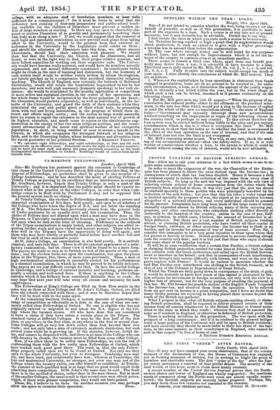CA MBItIDGE FELLOWSHIPS.
London, Apra 1854. Sut—Mr. Goulburn has protested against the extension to Cambridge of that clause in the Oxford University Reform Bill which provides that, in the disposal of Fellowships, no preference shall be given to any member of a College foundation ; and he has described the mode of electing Fellows at Trinity College as proving by its excellence that no interference is required. Mr. Goulburn, however, forgets that Trinity College is only a part of the University ; and it is important that the public mind should be exactly in- formed what is thepractice at the other Colleges, in order that when Cam- bridge comes to be dealt with by Parliament it may not be supposed that the present system needs no change. At Trinity College, the election to Fellowships depends upon a severe and impartial examination of five days, held yearly, and open to all scholars of the College who have taken the degree of B.A. and are below the standing of M.A. The Scholars have been previously chosen from the general body of Under-graduates by an equally strict and fair examination. Thus, the choice of Fellows does not depend upon what a man may have done in the Triposes, or University examinations for honours, a year or two years before, but upon what he does at the time of choosing. Proficiency in the subjects of the Tripes examinations is amply tested, and other subjects are added re- quiring further study and more vaned and mature powers. Those who have done well in the Tnposes have the opportunity of doing well again • and those who may have wholly or partially failed before have another full and fair trial in each of two successive years. At St. John's College, an examination is also held yearly. It is entirely classical, and lasts four days. There is all the external appearance of a satis- factory examination, but on closer view it will be found to be a mere form. The papers are made so easy as to furnish no test of the merits of the candi- dates ; and the election turns not upon the examination, but upon the places taken in the Triposes, two, three, or more years previously. Thus, a man of high mathematical attainments is ostensibly elected for his performances in a classical examination, in which he may be proved to be totally deficient. The papers set are just difficult enough for that. In fact, the second College in Cambridge, and a College of eminent industry and learning, i performs an- nually a solemn and well-acted farce. If there is anything n the College statutes which it has hitherto been considered desirable thus to evade, we may hope that next year will take away all excuse and necessity for such contrivances.
The Fellowships at King's College are filled up from Eton nearly in the same way as those at New College and St. John's College, Oxford, are filled from the schools connected with them ; and it may be therefore hoped that they will be dealt with in the same spirit. At the remaining fourteen Colleges, a system prevails of narrowing the range of competition as effectually as is done in the case of what are com- monly called close Fellowships at Oxford. No one is eligible who has not originally entered or migrated to and taken his B.A. degree at the Col- lege where the vacancy occurs. All who have done this are considered to have a claim if they have taken a certain place in the Tripes. The standard varies at different Colleges. It may be the first half of the firet class, or anywhere in the first class, or anywhere in the first or second class. Some Colleges will go very low down rather than look beyond their own walls ; and not only take a man of extremely moderate distinction, but wait several years while he is growing up. If the statutes, however, forbid de- lay, and cannot be dispensed with, and there is no man of the College who can with decency be chosen, the vacancy must be filled from some other College.
Now, if we allow these to be called open Fellowships, we run the risk of confounding them with the few really open Fellowships of Oxford, which have worked such great good there. The truth is, that the only Fellow- ships properly called open are to be found at Oxford. Not only are they open to the whole University, but even to strangers. Cambridge men may try, and have tried, and occasionally have won ; whereas at Cambridge, the free and modernized University, no stranger, not even any, man not of the College where the vacancy exists, can offer himself as candidate. At Trinity, the number of well-qualified men is so large that no good would result from admitting more competitors. Of St. John's the same may be said. The fault there is in the method of choice, rather than in the men chosen. But at most of the smaller Colleges, the usual result is that second-rate men obtain prizes, which, if there were greater competition, they would not have gained.
These, Sir, I believe to be facts. On another occasion you may perhaps
allow me space to examine their operation. Elves.


























 Previous page
Previous page